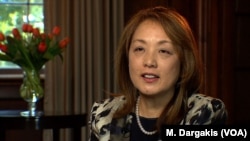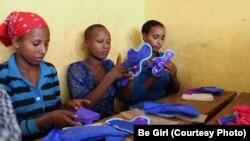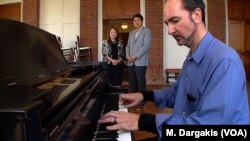As a scientist, Sachiko Kuno knows the value of experimentation and innovation.
She and her research partner-husband Ryuji Ueno made a fortune developing drugs to treat conditions such as glaucoma and irritable bowel syndrome. But the biotech entrepreneurs – founders of Sucampo Pharmaceuticals Inc. in the United States and R-Tech Ueno Ltd. in their native Japan – also are deeply invested in finding formulas to improve society.
Their laboratory for this philanthropic work is the year-old Halcyon Incubator, a residential program housed in a beautifully renovated 18th-century mansion in Washington’s historic Georgetown neighborhood.
Kuno, 60, calls Halcyon an "ecosystem" for "young social entrepreneurs to think about how they can ... solve 21st-century problems."
Fellows’ interests range widely: from starting a community solar project or a West African literacy program to eliminating carbon emissions or designing headphones that cancel motion sickness.
Stimulating, supportive environment
They live and work at Halcyon House for four months, then get free office space for another eight months. They meet with experts in marketing, law and other fields – as well as potential funders.
They also get to enjoy some of the arts programing of Halcyon’s parent S&R Foundation, headquartered at the Evermay Estate, another historic property several blocks away. The couple bought both properties in 2011 for a combined $33 million. The foundation began an arts awards program in 2000 and, after Evermay’s acquisition, started a concert series there in 2012.
At Halcyon, "you have an infrastructure," said former fellow Diana Sierra of Colombia. "You have the business plan. You have the chance to pitch to other people and show them your project – get advice."
Sierra developed the award-winning Be Girl project, which designs washable, reusable feminine hygiene pads and panties.
"Menstruation can be a very simple thing for people who have access to proper management materials, but if you don’t ... it can be a burden," Sierra said. UNICEF reports one in 10 girls skip school during their monthly periods – or even drop out – because they lack sanitation supplies or suffer teasing and embarrassment.
By talking with girls in Uganda and other test markets, Sierra learned that water shortages meant the products had to be easy to clean. BE GIRL’s website also says its reusable products are more environmentally friendly than disposable pads and tampons.
An encouraging presence
No matter what the fellows' focus, Kuno offers encouragement, says Amelia Friedman, who’s from the Washington suburb of Arlington, Virginia.
"She’s like the fairy godmother of Halcyon. ... She’s very careful to think about what’s the best way she can support us and our ventures," said Friedman, who started the Student Language Exchange as a Brown University sophomore. Now, it’s operating at six universities, with native speakers teaching their peers languages such as Bengali, Swahili and Dzongkha.
"Halcyon is really trying to bring together a diversity of people, a diversity of ideas ... to build a more vibrant community" to improve society, she said.
Diversity embraced
Kuno appreciates the need for diversity.
In her 20s, she was Kyoto University’s only female PhD candidate in industrial biochemistry, which she said sometimes left her feeling "isolated," as if she herself were under a microscope.
Kuno credits a professor for encouraging her to do post-doctoral research in Germany, at the Technical University of Munich, where she could work among other women as well as men. "The experience in Munich changed me to be more confident that what I am doing is correct," she said.
Her confidence grew, and 30 years ago she switched from academics to applied science – to business. Forbes, the business publication, estimates her worth at $330 million and ranks her 41st on its current list of self-made women in America.
"For me, business is a kind of tool," yielding better things for society, Kuno said. "… I’m always focused on what will be the final goal."
Kuno counts the S&R Foundation and its Halcyon program as deeply satisfying ventures that repay others’ investments in her.
"I was supported by many people when I was young, and many people who believed in my talent and capability and potential," she said. "So I just want to do the same thing [for] the next generation."
The scientist-philanthropist also hinted she may have still more future contributions of her own. She likes to undertake a fresh challenge, to "initialize my life every seven, eight years," Kuno said. ".... I do not like to sit on what I have done already."
Innovation awaits.






